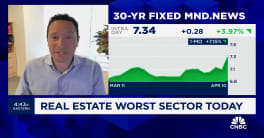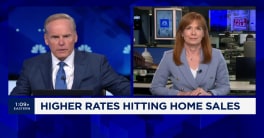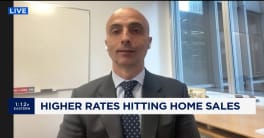Two Wall Street giants and their investors are betting that one of the Streets most baffling rules of thumb will prevail as the stock market prepared to open Friday after two days of a bullish market.
The rule, one that definitely does not apply to your family finances, is if bad news is not as bad as everyone expected, then it is actually good news.
Citigroup said early Friday morning that it lost $2.5 billion or 54 centers a share, in the second quarter of the year on $7.2 billion of write-downs from losses in its mortgage business and by general weakness in the consumer market. Street wisdom had projected that the company would post a loss of $0.66 per share.
The stock market had anticipated that the news might be better than expected and, in a day that saw an increase of 207 points in the Dow Jones average, Citigroup rose two points on Thursday to close at $17.97.
The CEO of Citigroup, Vikram Pandit, called the loss "progress." In Quarter One the company lost $5.1 billion and its losses have totaled more than $17 billion in the last year while the stock has fallen almost 70 percent. A half-hour into the trading day Friday Citigroup was up $1.15 per share.
J.P. Morgan also announced its quarter two results, marking down the value of some of its assets by over $1 billion. The financial giant which bought Bear Stearns as the U.S. Treasury Department scrambled wildly to prevent the company from going bankrupt over a weekend in April saw its net income fell to $2 billion or $0.54 cents a share compared to $1.20 a share at this time last year. Again, analysts had expected the revenues to dip to $0.44 cents a share so bad news was actually good.
Morgan's CEO, James Dimon said that the bank's losses could triple next year and cautioned that conditions could get worse as the economic environment continues to be weak.
Freddie Mac, which has enjoyed a two day rebound in its stock price after the Bush Administration virtually guaranteed that the huge government sponsored enterprise (GSE) would not be permitted to fail, is reported to be considering an offering of perhaps as much as $10 billion in new stock. If the stock offering is successful, it might help to avoid a full-scale government bail-out of Freddie and its sister GSE Fannie Mae.
Avoiding government intervention would allow Freddie and Fannie to avoid all of the attendant strings attached to federal money such as stricter government oversight and regulation.
Stocks in Freddie and Fannie, which were in free-fall before the "too big to fail" pronouncement by Treasury Secretary Henry Paulson earlier in the week, were trading at $8.44, up .08 and $11.75, up $0.11 respectively in early trading on Friday.







